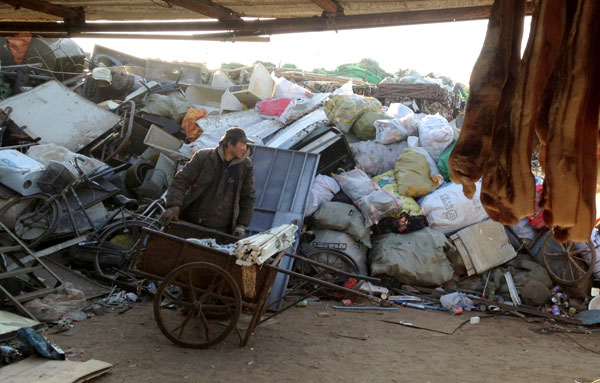Garbage recyclers make way for real estate
Updated: 2012-01-06 08:02
By Zheng Xin (China Daily)
|
|||||||||||
BEIJING - The capital's biggest garbage recycling market is on the brink of collapse, leaving thousands of workers homeless and out of work.
 |
|
A garbage sorter at the Dongxiaokou garbage recycling market in Beijing transport recyclable waste on Jan 1. Zheng Xin / China Daily |
Located outside the north section of the 5th Ring Road, Dongxiaokou garbage recycling market, one of the few large-scale recycling markets in Beijing, seems to be on its way to extinction after nearly eight years' existence, as the city keeps expanding outward, swallowing up the suburbs.
"We have been informed of the demolition plan at the beginning of 2011," said Li Jianzhong, a man in his 40s from Hebei province, who came to Beijing and started working in the market three years ago.
Pointing to the posters on the walls encouraging residents, most of them waste sorters, to move out as soon as possible, Li said he was very worried about his future.
"I have no idea where to go," said the man who works at a waste paper recycling company in the market.
And he is not the only one.
Most among the less than 30,000 workers engaged in around 800 workshops in the market hail from Henan province. A likely closure of the market will affect their livelihoods.
According to Shen Hongyu, an official in charge of the recyclable resource in Changping district, the move is aimed at upgrading these areas, as the "dirty market has aroused public concern and tarnished the capital's image".
"Most people working and living in the market are not originally from the area. There is concern that this might lead to safety issues for the locals," said Shen.
However, the government does not seem to be considering finding jobs for people working there or setting up a new garbage recycling market.
"It is up to them to find new homes and livelihoods," he said.
Some residents living nearby were unhappy with the dirty and disorderly nature of the market and also worried about public security.
"I agree that the market should be moved further north. Now it's too close to the business and residential areas," said Wang Bao, 27, a local resident near the market. "No one wants to live near so much garbage."
"However, we can't just shut it down without thinking of the workers' future, that would be irresponsible and might cause further social problems," Wang added.
The deadline for the demolition is not set yet.
"We can't drum them out simply because we want the city to look good, while ignoring their contribution in garbage collection and recycling," said Chen Liwen, researcher of Green Beagle, a Beijing-based environmental protection NGO.
According to Chen, garbage collectors and recyclers all across the city play a major role in picking up recyclable waste from the tremendous amount of garbage residents discarded everyday. The collected garbage is sorted into different categories, sold and reprocessed into useful stuff in neighboring provinces.
"They never complain about handling garbage everyday, but the government is going to ignore their condition just because the work they do is dirty," said Chen.
Many of the garbage workers are on the lookout for a new home, according to Du Kui, manager of the Dongxiaokou market.
Du said land in the outskirts of a city being taken up for real estate was inevitable, given Beijing's economic growth.
"However, the city's economy should not develop at the cost of sacrificing its waste recycling business," said Du.
"Previously the government would offer generous subsidy on taxation to those in the garbage recycling industry, but in the last few years there has been a rollback on preferential policies for recyclers," said Chen.
"The gains from real estate come easier and faster than that from recycling garbage, but losing one's work and home is not what those workers deserve," Chen said.
Hot Topics
Kim Jong-il, Mengniu, train crash probe, Vaclav Havel, New Year, coast guard death, Internet security, Mekong River, Strait of Hormuz, economic work conference
Editor's Picks

|

|

|

|

|

|







